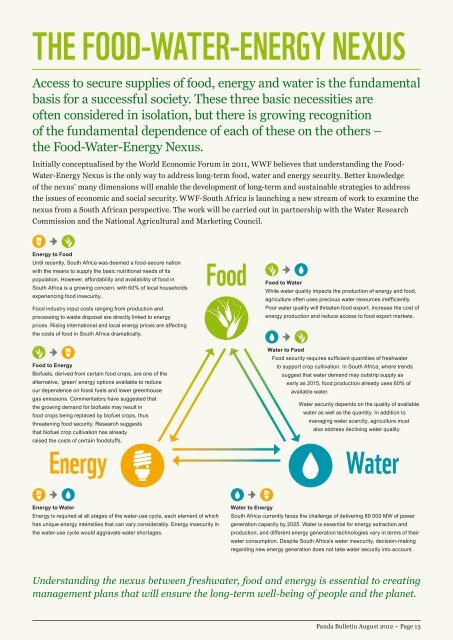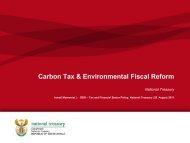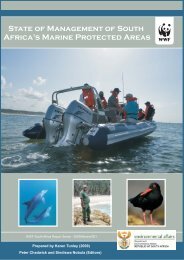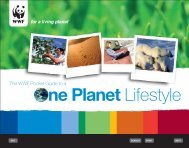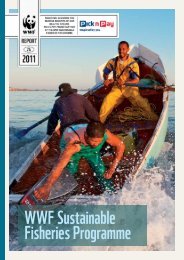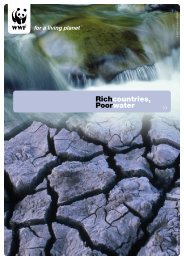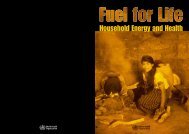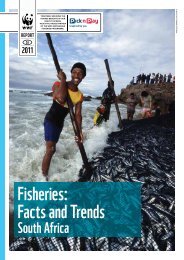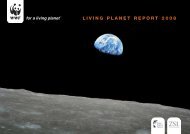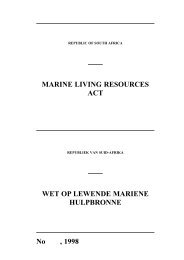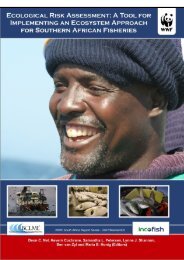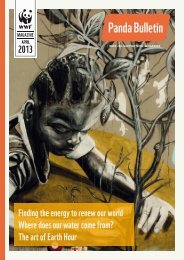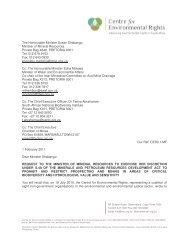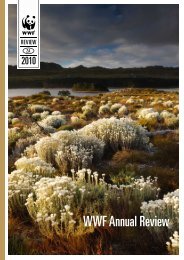Living Planet Report - WWF South Africa
Living Planet Report - WWF South Africa
Living Planet Report - WWF South Africa
You also want an ePaper? Increase the reach of your titles
YUMPU automatically turns print PDFs into web optimized ePapers that Google loves.
ThE FOOD-WATER-ENERGY NExUS<br />
Access to secure supplies of food, energy and water is the fundamental<br />
basis for a successful society. These three basic necessities are<br />
often considered in isolation, but there is growing recognition<br />
of the fundamental dependence of each of these on the others –<br />
the Food-Water-Energy Nexus.<br />
Initially conceptualised by the World Economic Forum in 2011, <strong>WWF</strong> believes that understanding the Food-<br />
Water-Energy Nexus is the only way to address long-term food, water and energy security. Better knowledge<br />
of the nexus’ many dimensions will enable the development of long-term and sustainable strategies to address<br />
the issues of economic and social security. <strong>WWF</strong>-<strong>South</strong> <strong>Africa</strong> is launching a new stream of work to examine the<br />
nexus from a <strong>South</strong> <strong>Africa</strong>n perspective. The work will be carried out in partnership with the Water Research<br />
Commission and the National Agricultural and Marketing Council.<br />
energy to Food<br />
until recently, <strong>South</strong> <strong>Africa</strong> was deemed a food-secure nation<br />
with the means to supply the basic nutritional needs of its<br />
population. However, affordability and availability of food in<br />
<strong>South</strong> <strong>Africa</strong> is a growing concern, with 60% of local households<br />
experiencing food insecurity.<br />
Food industry input costs ranging from production and<br />
processing to waste disposal are directly linked to energy<br />
prices. rising international and local energy prices are affecting<br />
the costs of food in <strong>South</strong> <strong>Africa</strong> dramatically.<br />
Food to energy<br />
Biofuels, derived from certain food crops, are one of the<br />
alternative, ‘green’ energy options available to reduce<br />
our dependence on fossil fuels and lower greenhouse<br />
gas emissions. Commentators have suggested that<br />
the growing demand for biofuels may result in<br />
food crops being replaced by biofuel crops, thus<br />
threatening food security. research suggests<br />
that biofuel crop cultivation has already<br />
raised the costs of certain foodstuffs.<br />
Energy<br />
energy to Water<br />
energy is required at all stages of the water-use cycle, each element of which<br />
has unique energy intensities that can vary considerably. energy insecurity in<br />
the water-use cycle would aggravate water shortages.<br />
Food<br />
Food to Water<br />
While water quality impacts the production of energy and food,<br />
agriculture often uses precious water resources inefficiently.<br />
Poor water quality will threaten food export, increase the cost of<br />
energy production and reduce access to food export markets.<br />
Water to Food<br />
Food security requires sufficient quantities of freshwater<br />
to support crop cultivation. in <strong>South</strong> <strong>Africa</strong>, where trends<br />
suggest that water demand may outstrip supply as<br />
early as 2015, food production already uses 60% of<br />
available water.<br />
Water security depends on the quality of available<br />
water as well as the quantity. in addition to<br />
managing water scarcity, agriculture must<br />
also address declining water quality.<br />
Water<br />
Water to energy<br />
<strong>South</strong> <strong>Africa</strong> currently faces the challenge of delivering 89 000 MW of power<br />
generation capacity by 2025. Water is essential for energy extraction and<br />
production, and different energy generation technologies vary in terms of their<br />
water consumption. Despite <strong>South</strong> <strong>Africa</strong>’s water insecurity, decision-making<br />
regarding new energy generation does not take water security into account.<br />
Understanding the nexus between freshwater, food and energy is essential to creating<br />
management plans that will ensure the long-term well-being of people and the planet.<br />
Panda Bulletin August 2012 – Page 13


